Analyzing Health Issues: Racial and Religious Discrimination Impact
VerifiedAdded on 2023/06/12
|14
|4960
|128
Essay
AI Summary
This essay examines the detrimental health effects of racial and religious discrimination on affected populations, focusing on African Americans, Muslims, and Jews. It highlights how discrimination leads to limited access to employment, education, and healthcare, contributing to mental health issues like depression and anxiety, and physical health problems. The essay identifies social determinants such as historical injustices, hate crimes, and disproportionate exposure to unhealthy environments. It also addresses barriers to healthcare access, including cultural incompetence and disparities in treatment quality. The discussion extends to the role of stakeholders in addressing these social determinants to promote health equality, emphasizing the need to dismantle systemic racism and improve healthcare access for marginalized communities. Desklib offers this essay and related resources to aid students in understanding these critical issues.

Running head: HEALTH ISSUES 1
Health Issues
Name
Institution
Health Issues
Name
Institution
Paraphrase This Document
Need a fresh take? Get an instant paraphrase of this document with our AI Paraphraser
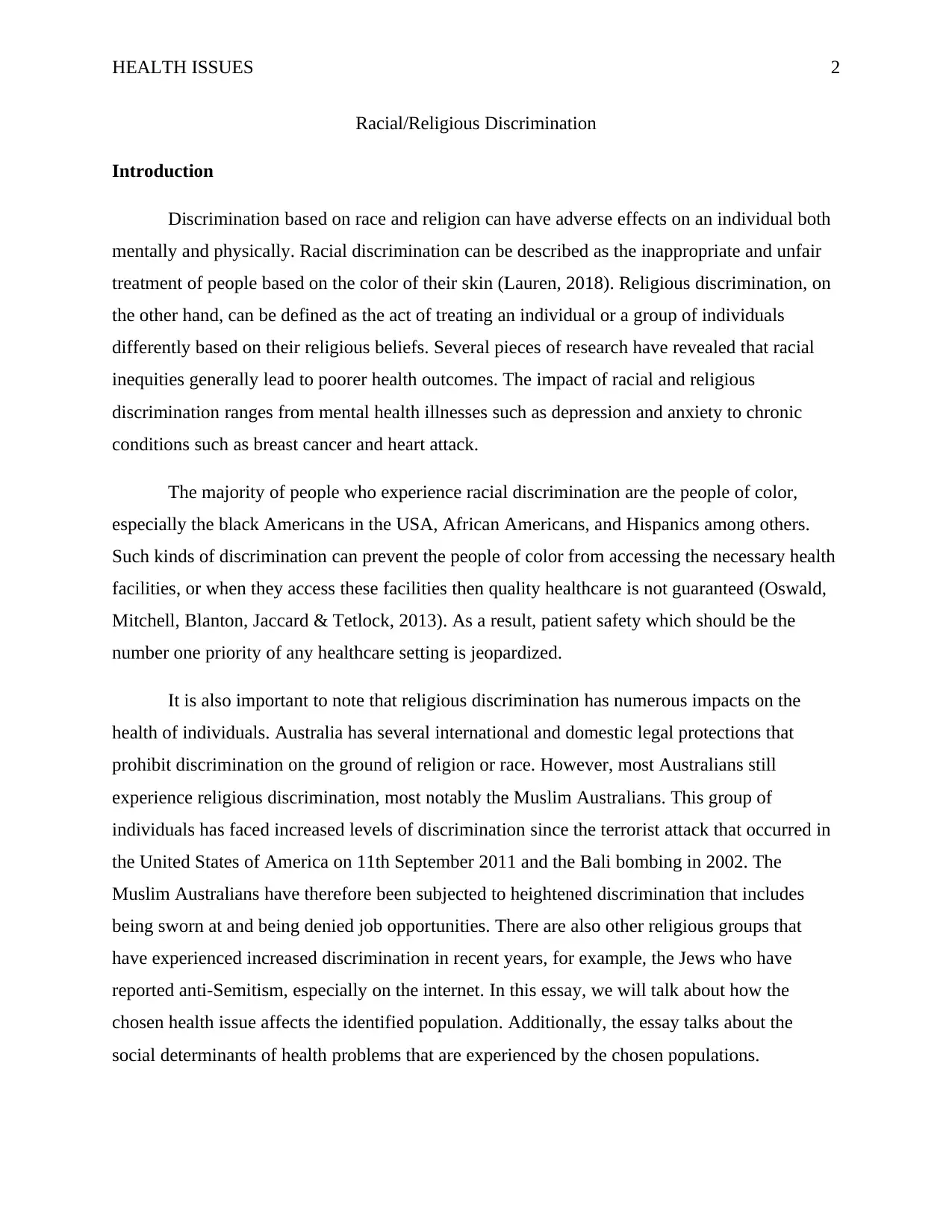
HEALTH ISSUES 2
Racial/Religious Discrimination
Introduction
Discrimination based on race and religion can have adverse effects on an individual both
mentally and physically. Racial discrimination can be described as the inappropriate and unfair
treatment of people based on the color of their skin (Lauren, 2018). Religious discrimination, on
the other hand, can be defined as the act of treating an individual or a group of individuals
differently based on their religious beliefs. Several pieces of research have revealed that racial
inequities generally lead to poorer health outcomes. The impact of racial and religious
discrimination ranges from mental health illnesses such as depression and anxiety to chronic
conditions such as breast cancer and heart attack.
The majority of people who experience racial discrimination are the people of color,
especially the black Americans in the USA, African Americans, and Hispanics among others.
Such kinds of discrimination can prevent the people of color from accessing the necessary health
facilities, or when they access these facilities then quality healthcare is not guaranteed (Oswald,
Mitchell, Blanton, Jaccard & Tetlock, 2013). As a result, patient safety which should be the
number one priority of any healthcare setting is jeopardized.
It is also important to note that religious discrimination has numerous impacts on the
health of individuals. Australia has several international and domestic legal protections that
prohibit discrimination on the ground of religion or race. However, most Australians still
experience religious discrimination, most notably the Muslim Australians. This group of
individuals has faced increased levels of discrimination since the terrorist attack that occurred in
the United States of America on 11th September 2011 and the Bali bombing in 2002. The
Muslim Australians have therefore been subjected to heightened discrimination that includes
being sworn at and being denied job opportunities. There are also other religious groups that
have experienced increased discrimination in recent years, for example, the Jews who have
reported anti-Semitism, especially on the internet. In this essay, we will talk about how the
chosen health issue affects the identified population. Additionally, the essay talks about the
social determinants of health problems that are experienced by the chosen populations.
Racial/Religious Discrimination
Introduction
Discrimination based on race and religion can have adverse effects on an individual both
mentally and physically. Racial discrimination can be described as the inappropriate and unfair
treatment of people based on the color of their skin (Lauren, 2018). Religious discrimination, on
the other hand, can be defined as the act of treating an individual or a group of individuals
differently based on their religious beliefs. Several pieces of research have revealed that racial
inequities generally lead to poorer health outcomes. The impact of racial and religious
discrimination ranges from mental health illnesses such as depression and anxiety to chronic
conditions such as breast cancer and heart attack.
The majority of people who experience racial discrimination are the people of color,
especially the black Americans in the USA, African Americans, and Hispanics among others.
Such kinds of discrimination can prevent the people of color from accessing the necessary health
facilities, or when they access these facilities then quality healthcare is not guaranteed (Oswald,
Mitchell, Blanton, Jaccard & Tetlock, 2013). As a result, patient safety which should be the
number one priority of any healthcare setting is jeopardized.
It is also important to note that religious discrimination has numerous impacts on the
health of individuals. Australia has several international and domestic legal protections that
prohibit discrimination on the ground of religion or race. However, most Australians still
experience religious discrimination, most notably the Muslim Australians. This group of
individuals has faced increased levels of discrimination since the terrorist attack that occurred in
the United States of America on 11th September 2011 and the Bali bombing in 2002. The
Muslim Australians have therefore been subjected to heightened discrimination that includes
being sworn at and being denied job opportunities. There are also other religious groups that
have experienced increased discrimination in recent years, for example, the Jews who have
reported anti-Semitism, especially on the internet. In this essay, we will talk about how the
chosen health issue affects the identified population. Additionally, the essay talks about the
social determinants of health problems that are experienced by the chosen populations.
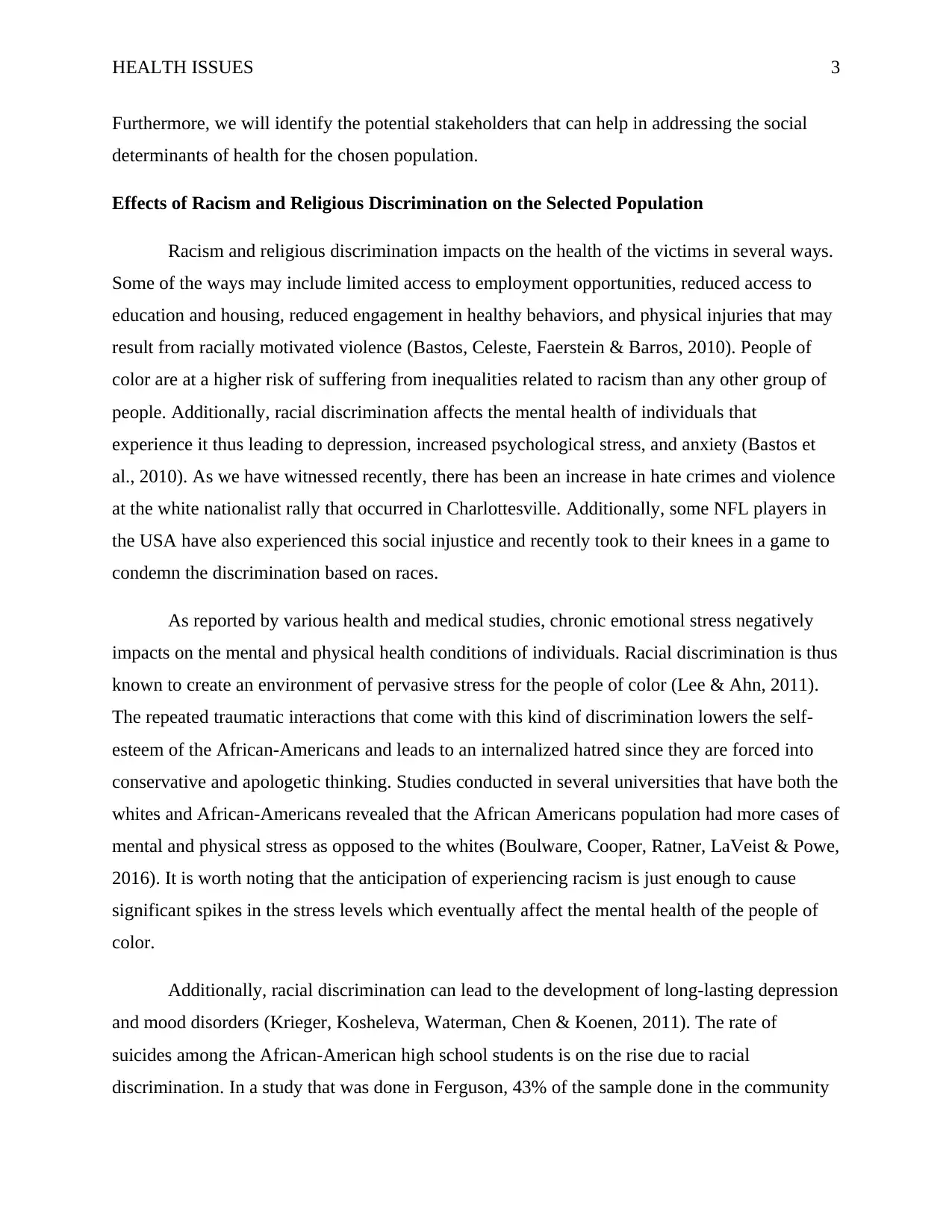
HEALTH ISSUES 3
Furthermore, we will identify the potential stakeholders that can help in addressing the social
determinants of health for the chosen population.
Effects of Racism and Religious Discrimination on the Selected Population
Racism and religious discrimination impacts on the health of the victims in several ways.
Some of the ways may include limited access to employment opportunities, reduced access to
education and housing, reduced engagement in healthy behaviors, and physical injuries that may
result from racially motivated violence (Bastos, Celeste, Faerstein & Barros, 2010). People of
color are at a higher risk of suffering from inequalities related to racism than any other group of
people. Additionally, racial discrimination affects the mental health of individuals that
experience it thus leading to depression, increased psychological stress, and anxiety (Bastos et
al., 2010). As we have witnessed recently, there has been an increase in hate crimes and violence
at the white nationalist rally that occurred in Charlottesville. Additionally, some NFL players in
the USA have also experienced this social injustice and recently took to their knees in a game to
condemn the discrimination based on races.
As reported by various health and medical studies, chronic emotional stress negatively
impacts on the mental and physical health conditions of individuals. Racial discrimination is thus
known to create an environment of pervasive stress for the people of color (Lee & Ahn, 2011).
The repeated traumatic interactions that come with this kind of discrimination lowers the self-
esteem of the African-Americans and leads to an internalized hatred since they are forced into
conservative and apologetic thinking. Studies conducted in several universities that have both the
whites and African-Americans revealed that the African Americans population had more cases of
mental and physical stress as opposed to the whites (Boulware, Cooper, Ratner, LaVeist & Powe,
2016). It is worth noting that the anticipation of experiencing racism is just enough to cause
significant spikes in the stress levels which eventually affect the mental health of the people of
color.
Additionally, racial discrimination can lead to the development of long-lasting depression
and mood disorders (Krieger, Kosheleva, Waterman, Chen & Koenen, 2011). The rate of
suicides among the African-American high school students is on the rise due to racial
discrimination. In a study that was done in Ferguson, 43% of the sample done in the community
Furthermore, we will identify the potential stakeholders that can help in addressing the social
determinants of health for the chosen population.
Effects of Racism and Religious Discrimination on the Selected Population
Racism and religious discrimination impacts on the health of the victims in several ways.
Some of the ways may include limited access to employment opportunities, reduced access to
education and housing, reduced engagement in healthy behaviors, and physical injuries that may
result from racially motivated violence (Bastos, Celeste, Faerstein & Barros, 2010). People of
color are at a higher risk of suffering from inequalities related to racism than any other group of
people. Additionally, racial discrimination affects the mental health of individuals that
experience it thus leading to depression, increased psychological stress, and anxiety (Bastos et
al., 2010). As we have witnessed recently, there has been an increase in hate crimes and violence
at the white nationalist rally that occurred in Charlottesville. Additionally, some NFL players in
the USA have also experienced this social injustice and recently took to their knees in a game to
condemn the discrimination based on races.
As reported by various health and medical studies, chronic emotional stress negatively
impacts on the mental and physical health conditions of individuals. Racial discrimination is thus
known to create an environment of pervasive stress for the people of color (Lee & Ahn, 2011).
The repeated traumatic interactions that come with this kind of discrimination lowers the self-
esteem of the African-Americans and leads to an internalized hatred since they are forced into
conservative and apologetic thinking. Studies conducted in several universities that have both the
whites and African-Americans revealed that the African Americans population had more cases of
mental and physical stress as opposed to the whites (Boulware, Cooper, Ratner, LaVeist & Powe,
2016). It is worth noting that the anticipation of experiencing racism is just enough to cause
significant spikes in the stress levels which eventually affect the mental health of the people of
color.
Additionally, racial discrimination can lead to the development of long-lasting depression
and mood disorders (Krieger, Kosheleva, Waterman, Chen & Koenen, 2011). The rate of
suicides among the African-American high school students is on the rise due to racial
discrimination. In a study that was done in Ferguson, 43% of the sample done in the community
⊘ This is a preview!⊘
Do you want full access?
Subscribe today to unlock all pages.

Trusted by 1+ million students worldwide
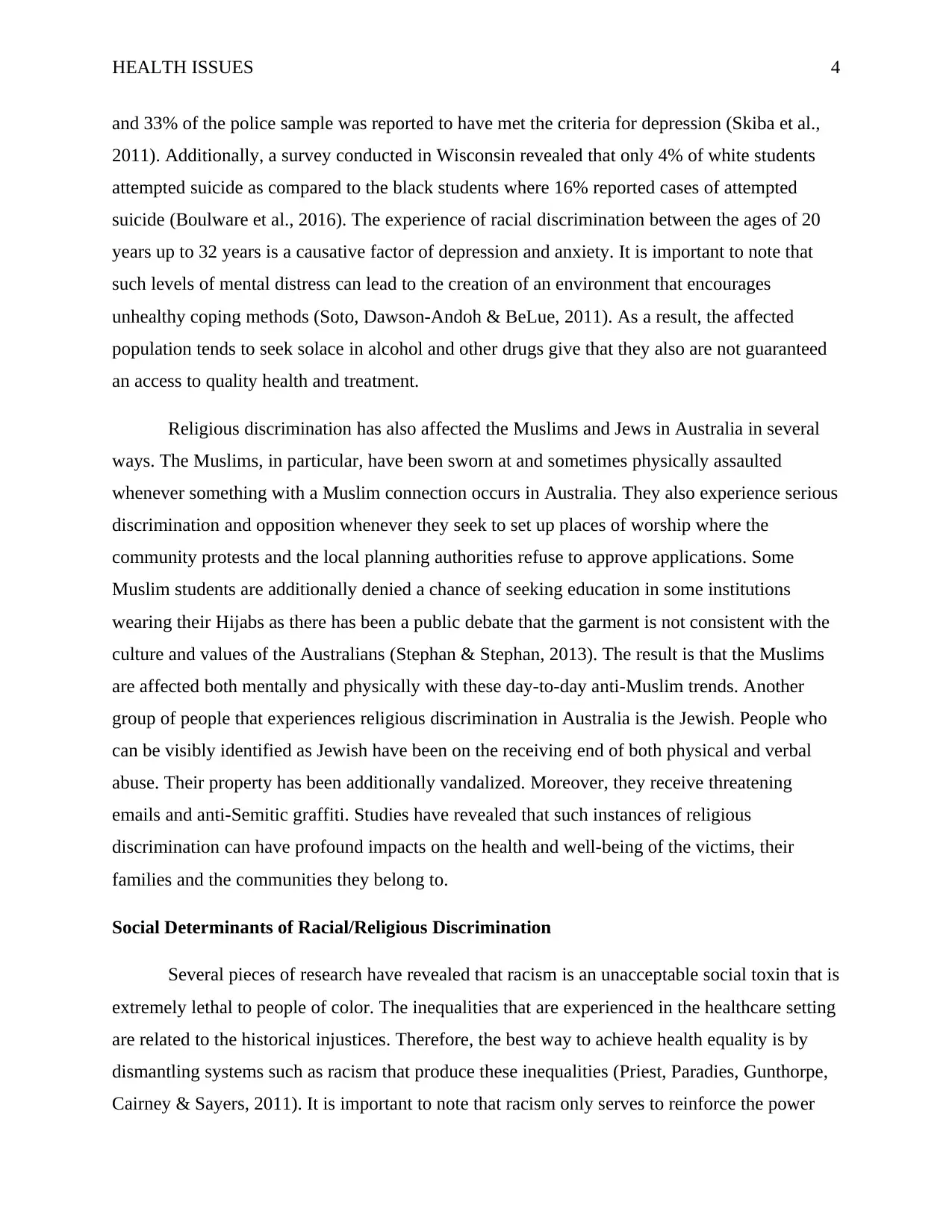
HEALTH ISSUES 4
and 33% of the police sample was reported to have met the criteria for depression (Skiba et al.,
2011). Additionally, a survey conducted in Wisconsin revealed that only 4% of white students
attempted suicide as compared to the black students where 16% reported cases of attempted
suicide (Boulware et al., 2016). The experience of racial discrimination between the ages of 20
years up to 32 years is a causative factor of depression and anxiety. It is important to note that
such levels of mental distress can lead to the creation of an environment that encourages
unhealthy coping methods (Soto, Dawson-Andoh & BeLue, 2011). As a result, the affected
population tends to seek solace in alcohol and other drugs give that they also are not guaranteed
an access to quality health and treatment.
Religious discrimination has also affected the Muslims and Jews in Australia in several
ways. The Muslims, in particular, have been sworn at and sometimes physically assaulted
whenever something with a Muslim connection occurs in Australia. They also experience serious
discrimination and opposition whenever they seek to set up places of worship where the
community protests and the local planning authorities refuse to approve applications. Some
Muslim students are additionally denied a chance of seeking education in some institutions
wearing their Hijabs as there has been a public debate that the garment is not consistent with the
culture and values of the Australians (Stephan & Stephan, 2013). The result is that the Muslims
are affected both mentally and physically with these day-to-day anti-Muslim trends. Another
group of people that experiences religious discrimination in Australia is the Jewish. People who
can be visibly identified as Jewish have been on the receiving end of both physical and verbal
abuse. Their property has been additionally vandalized. Moreover, they receive threatening
emails and anti-Semitic graffiti. Studies have revealed that such instances of religious
discrimination can have profound impacts on the health and well-being of the victims, their
families and the communities they belong to.
Social Determinants of Racial/Religious Discrimination
Several pieces of research have revealed that racism is an unacceptable social toxin that is
extremely lethal to people of color. The inequalities that are experienced in the healthcare setting
are related to the historical injustices. Therefore, the best way to achieve health equality is by
dismantling systems such as racism that produce these inequalities (Priest, Paradies, Gunthorpe,
Cairney & Sayers, 2011). It is important to note that racism only serves to reinforce the power
and 33% of the police sample was reported to have met the criteria for depression (Skiba et al.,
2011). Additionally, a survey conducted in Wisconsin revealed that only 4% of white students
attempted suicide as compared to the black students where 16% reported cases of attempted
suicide (Boulware et al., 2016). The experience of racial discrimination between the ages of 20
years up to 32 years is a causative factor of depression and anxiety. It is important to note that
such levels of mental distress can lead to the creation of an environment that encourages
unhealthy coping methods (Soto, Dawson-Andoh & BeLue, 2011). As a result, the affected
population tends to seek solace in alcohol and other drugs give that they also are not guaranteed
an access to quality health and treatment.
Religious discrimination has also affected the Muslims and Jews in Australia in several
ways. The Muslims, in particular, have been sworn at and sometimes physically assaulted
whenever something with a Muslim connection occurs in Australia. They also experience serious
discrimination and opposition whenever they seek to set up places of worship where the
community protests and the local planning authorities refuse to approve applications. Some
Muslim students are additionally denied a chance of seeking education in some institutions
wearing their Hijabs as there has been a public debate that the garment is not consistent with the
culture and values of the Australians (Stephan & Stephan, 2013). The result is that the Muslims
are affected both mentally and physically with these day-to-day anti-Muslim trends. Another
group of people that experiences religious discrimination in Australia is the Jewish. People who
can be visibly identified as Jewish have been on the receiving end of both physical and verbal
abuse. Their property has been additionally vandalized. Moreover, they receive threatening
emails and anti-Semitic graffiti. Studies have revealed that such instances of religious
discrimination can have profound impacts on the health and well-being of the victims, their
families and the communities they belong to.
Social Determinants of Racial/Religious Discrimination
Several pieces of research have revealed that racism is an unacceptable social toxin that is
extremely lethal to people of color. The inequalities that are experienced in the healthcare setting
are related to the historical injustices. Therefore, the best way to achieve health equality is by
dismantling systems such as racism that produce these inequalities (Priest, Paradies, Gunthorpe,
Cairney & Sayers, 2011). It is important to note that racism only serves to reinforce the power
Paraphrase This Document
Need a fresh take? Get an instant paraphrase of this document with our AI Paraphraser
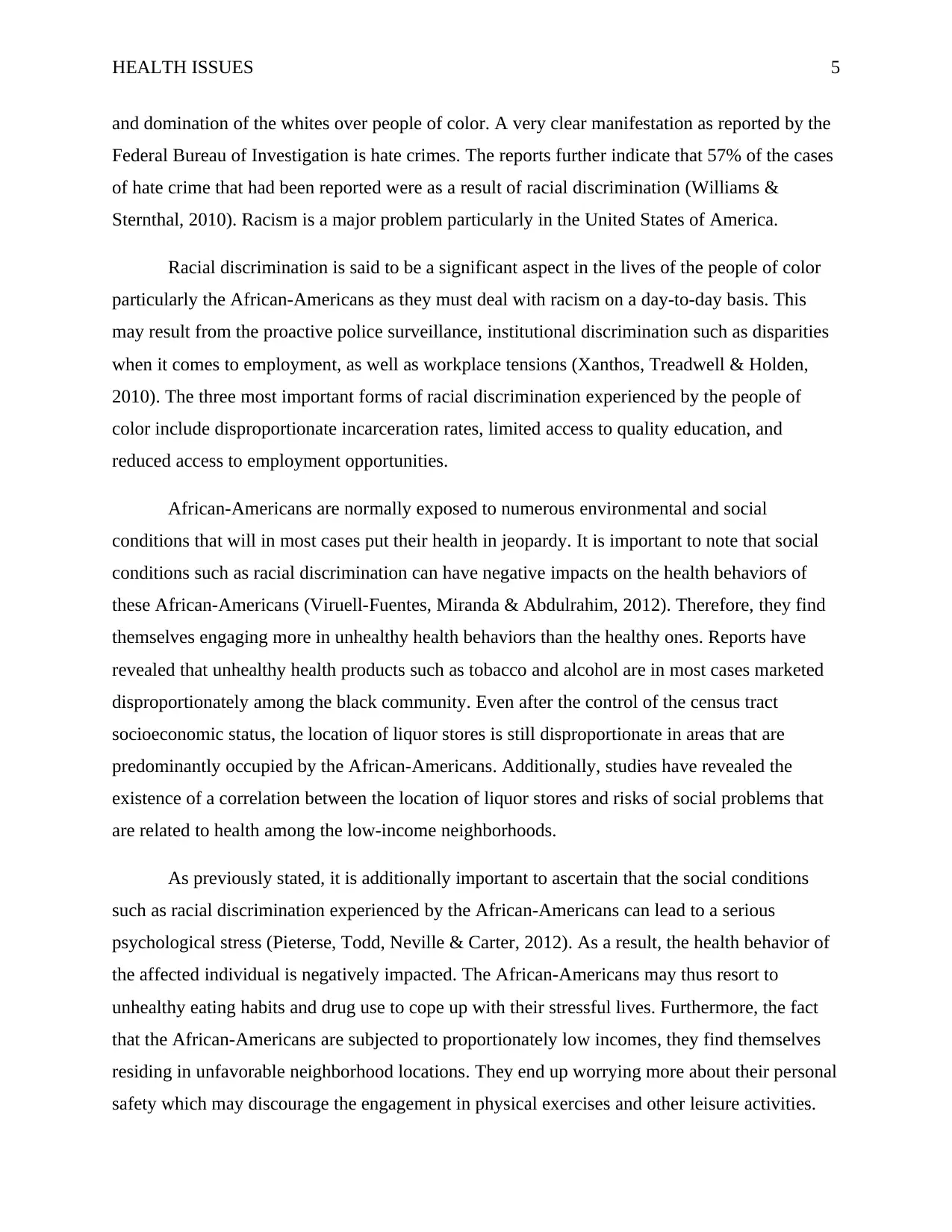
HEALTH ISSUES 5
and domination of the whites over people of color. A very clear manifestation as reported by the
Federal Bureau of Investigation is hate crimes. The reports further indicate that 57% of the cases
of hate crime that had been reported were as a result of racial discrimination (Williams &
Sternthal, 2010). Racism is a major problem particularly in the United States of America.
Racial discrimination is said to be a significant aspect in the lives of the people of color
particularly the African-Americans as they must deal with racism on a day-to-day basis. This
may result from the proactive police surveillance, institutional discrimination such as disparities
when it comes to employment, as well as workplace tensions (Xanthos, Treadwell & Holden,
2010). The three most important forms of racial discrimination experienced by the people of
color include disproportionate incarceration rates, limited access to quality education, and
reduced access to employment opportunities.
African-Americans are normally exposed to numerous environmental and social
conditions that will in most cases put their health in jeopardy. It is important to note that social
conditions such as racial discrimination can have negative impacts on the health behaviors of
these African-Americans (Viruell-Fuentes, Miranda & Abdulrahim, 2012). Therefore, they find
themselves engaging more in unhealthy health behaviors than the healthy ones. Reports have
revealed that unhealthy health products such as tobacco and alcohol are in most cases marketed
disproportionately among the black community. Even after the control of the census tract
socioeconomic status, the location of liquor stores is still disproportionate in areas that are
predominantly occupied by the African-Americans. Additionally, studies have revealed the
existence of a correlation between the location of liquor stores and risks of social problems that
are related to health among the low-income neighborhoods.
As previously stated, it is additionally important to ascertain that the social conditions
such as racial discrimination experienced by the African-Americans can lead to a serious
psychological stress (Pieterse, Todd, Neville & Carter, 2012). As a result, the health behavior of
the affected individual is negatively impacted. The African-Americans may thus resort to
unhealthy eating habits and drug use to cope up with their stressful lives. Furthermore, the fact
that the African-Americans are subjected to proportionately low incomes, they find themselves
residing in unfavorable neighborhood locations. They end up worrying more about their personal
safety which may discourage the engagement in physical exercises and other leisure activities.
and domination of the whites over people of color. A very clear manifestation as reported by the
Federal Bureau of Investigation is hate crimes. The reports further indicate that 57% of the cases
of hate crime that had been reported were as a result of racial discrimination (Williams &
Sternthal, 2010). Racism is a major problem particularly in the United States of America.
Racial discrimination is said to be a significant aspect in the lives of the people of color
particularly the African-Americans as they must deal with racism on a day-to-day basis. This
may result from the proactive police surveillance, institutional discrimination such as disparities
when it comes to employment, as well as workplace tensions (Xanthos, Treadwell & Holden,
2010). The three most important forms of racial discrimination experienced by the people of
color include disproportionate incarceration rates, limited access to quality education, and
reduced access to employment opportunities.
African-Americans are normally exposed to numerous environmental and social
conditions that will in most cases put their health in jeopardy. It is important to note that social
conditions such as racial discrimination can have negative impacts on the health behaviors of
these African-Americans (Viruell-Fuentes, Miranda & Abdulrahim, 2012). Therefore, they find
themselves engaging more in unhealthy health behaviors than the healthy ones. Reports have
revealed that unhealthy health products such as tobacco and alcohol are in most cases marketed
disproportionately among the black community. Even after the control of the census tract
socioeconomic status, the location of liquor stores is still disproportionate in areas that are
predominantly occupied by the African-Americans. Additionally, studies have revealed the
existence of a correlation between the location of liquor stores and risks of social problems that
are related to health among the low-income neighborhoods.
As previously stated, it is additionally important to ascertain that the social conditions
such as racial discrimination experienced by the African-Americans can lead to a serious
psychological stress (Pieterse, Todd, Neville & Carter, 2012). As a result, the health behavior of
the affected individual is negatively impacted. The African-Americans may thus resort to
unhealthy eating habits and drug use to cope up with their stressful lives. Furthermore, the fact
that the African-Americans are subjected to proportionately low incomes, they find themselves
residing in unfavorable neighborhood locations. They end up worrying more about their personal
safety which may discourage the engagement in physical exercises and other leisure activities.
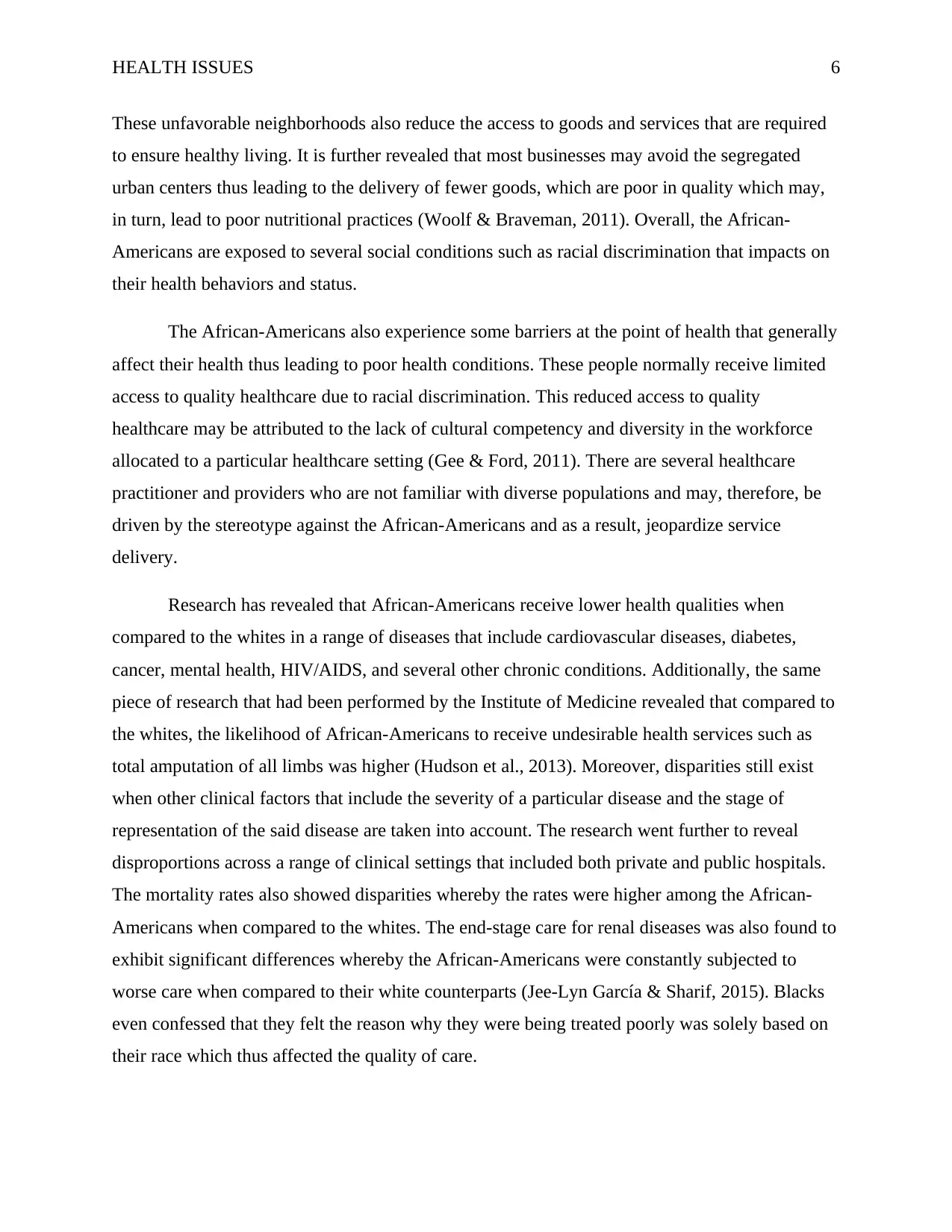
HEALTH ISSUES 6
These unfavorable neighborhoods also reduce the access to goods and services that are required
to ensure healthy living. It is further revealed that most businesses may avoid the segregated
urban centers thus leading to the delivery of fewer goods, which are poor in quality which may,
in turn, lead to poor nutritional practices (Woolf & Braveman, 2011). Overall, the African-
Americans are exposed to several social conditions such as racial discrimination that impacts on
their health behaviors and status.
The African-Americans also experience some barriers at the point of health that generally
affect their health thus leading to poor health conditions. These people normally receive limited
access to quality healthcare due to racial discrimination. This reduced access to quality
healthcare may be attributed to the lack of cultural competency and diversity in the workforce
allocated to a particular healthcare setting (Gee & Ford, 2011). There are several healthcare
practitioner and providers who are not familiar with diverse populations and may, therefore, be
driven by the stereotype against the African-Americans and as a result, jeopardize service
delivery.
Research has revealed that African-Americans receive lower health qualities when
compared to the whites in a range of diseases that include cardiovascular diseases, diabetes,
cancer, mental health, HIV/AIDS, and several other chronic conditions. Additionally, the same
piece of research that had been performed by the Institute of Medicine revealed that compared to
the whites, the likelihood of African-Americans to receive undesirable health services such as
total amputation of all limbs was higher (Hudson et al., 2013). Moreover, disparities still exist
when other clinical factors that include the severity of a particular disease and the stage of
representation of the said disease are taken into account. The research went further to reveal
disproportions across a range of clinical settings that included both private and public hospitals.
The mortality rates also showed disparities whereby the rates were higher among the African-
Americans when compared to the whites. The end-stage care for renal diseases was also found to
exhibit significant differences whereby the African-Americans were constantly subjected to
worse care when compared to their white counterparts (Jee-Lyn García & Sharif, 2015). Blacks
even confessed that they felt the reason why they were being treated poorly was solely based on
their race which thus affected the quality of care.
These unfavorable neighborhoods also reduce the access to goods and services that are required
to ensure healthy living. It is further revealed that most businesses may avoid the segregated
urban centers thus leading to the delivery of fewer goods, which are poor in quality which may,
in turn, lead to poor nutritional practices (Woolf & Braveman, 2011). Overall, the African-
Americans are exposed to several social conditions such as racial discrimination that impacts on
their health behaviors and status.
The African-Americans also experience some barriers at the point of health that generally
affect their health thus leading to poor health conditions. These people normally receive limited
access to quality healthcare due to racial discrimination. This reduced access to quality
healthcare may be attributed to the lack of cultural competency and diversity in the workforce
allocated to a particular healthcare setting (Gee & Ford, 2011). There are several healthcare
practitioner and providers who are not familiar with diverse populations and may, therefore, be
driven by the stereotype against the African-Americans and as a result, jeopardize service
delivery.
Research has revealed that African-Americans receive lower health qualities when
compared to the whites in a range of diseases that include cardiovascular diseases, diabetes,
cancer, mental health, HIV/AIDS, and several other chronic conditions. Additionally, the same
piece of research that had been performed by the Institute of Medicine revealed that compared to
the whites, the likelihood of African-Americans to receive undesirable health services such as
total amputation of all limbs was higher (Hudson et al., 2013). Moreover, disparities still exist
when other clinical factors that include the severity of a particular disease and the stage of
representation of the said disease are taken into account. The research went further to reveal
disproportions across a range of clinical settings that included both private and public hospitals.
The mortality rates also showed disparities whereby the rates were higher among the African-
Americans when compared to the whites. The end-stage care for renal diseases was also found to
exhibit significant differences whereby the African-Americans were constantly subjected to
worse care when compared to their white counterparts (Jee-Lyn García & Sharif, 2015). Blacks
even confessed that they felt the reason why they were being treated poorly was solely based on
their race which thus affected the quality of care.
⊘ This is a preview!⊘
Do you want full access?
Subscribe today to unlock all pages.

Trusted by 1+ million students worldwide
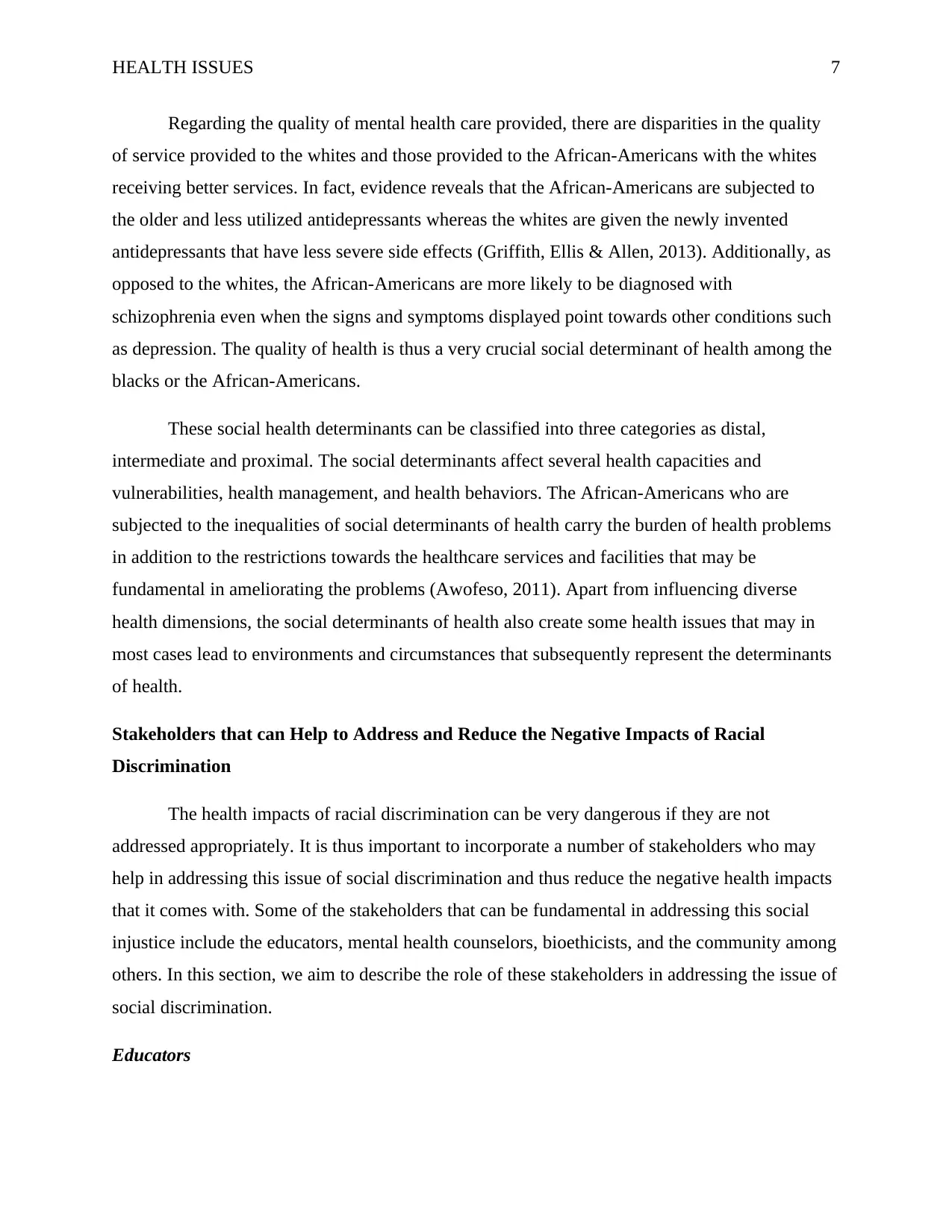
HEALTH ISSUES 7
Regarding the quality of mental health care provided, there are disparities in the quality
of service provided to the whites and those provided to the African-Americans with the whites
receiving better services. In fact, evidence reveals that the African-Americans are subjected to
the older and less utilized antidepressants whereas the whites are given the newly invented
antidepressants that have less severe side effects (Griffith, Ellis & Allen, 2013). Additionally, as
opposed to the whites, the African-Americans are more likely to be diagnosed with
schizophrenia even when the signs and symptoms displayed point towards other conditions such
as depression. The quality of health is thus a very crucial social determinant of health among the
blacks or the African-Americans.
These social health determinants can be classified into three categories as distal,
intermediate and proximal. The social determinants affect several health capacities and
vulnerabilities, health management, and health behaviors. The African-Americans who are
subjected to the inequalities of social determinants of health carry the burden of health problems
in addition to the restrictions towards the healthcare services and facilities that may be
fundamental in ameliorating the problems (Awofeso, 2011). Apart from influencing diverse
health dimensions, the social determinants of health also create some health issues that may in
most cases lead to environments and circumstances that subsequently represent the determinants
of health.
Stakeholders that can Help to Address and Reduce the Negative Impacts of Racial
Discrimination
The health impacts of racial discrimination can be very dangerous if they are not
addressed appropriately. It is thus important to incorporate a number of stakeholders who may
help in addressing this issue of social discrimination and thus reduce the negative health impacts
that it comes with. Some of the stakeholders that can be fundamental in addressing this social
injustice include the educators, mental health counselors, bioethicists, and the community among
others. In this section, we aim to describe the role of these stakeholders in addressing the issue of
social discrimination.
Educators
Regarding the quality of mental health care provided, there are disparities in the quality
of service provided to the whites and those provided to the African-Americans with the whites
receiving better services. In fact, evidence reveals that the African-Americans are subjected to
the older and less utilized antidepressants whereas the whites are given the newly invented
antidepressants that have less severe side effects (Griffith, Ellis & Allen, 2013). Additionally, as
opposed to the whites, the African-Americans are more likely to be diagnosed with
schizophrenia even when the signs and symptoms displayed point towards other conditions such
as depression. The quality of health is thus a very crucial social determinant of health among the
blacks or the African-Americans.
These social health determinants can be classified into three categories as distal,
intermediate and proximal. The social determinants affect several health capacities and
vulnerabilities, health management, and health behaviors. The African-Americans who are
subjected to the inequalities of social determinants of health carry the burden of health problems
in addition to the restrictions towards the healthcare services and facilities that may be
fundamental in ameliorating the problems (Awofeso, 2011). Apart from influencing diverse
health dimensions, the social determinants of health also create some health issues that may in
most cases lead to environments and circumstances that subsequently represent the determinants
of health.
Stakeholders that can Help to Address and Reduce the Negative Impacts of Racial
Discrimination
The health impacts of racial discrimination can be very dangerous if they are not
addressed appropriately. It is thus important to incorporate a number of stakeholders who may
help in addressing this issue of social discrimination and thus reduce the negative health impacts
that it comes with. Some of the stakeholders that can be fundamental in addressing this social
injustice include the educators, mental health counselors, bioethicists, and the community among
others. In this section, we aim to describe the role of these stakeholders in addressing the issue of
social discrimination.
Educators
Paraphrase This Document
Need a fresh take? Get an instant paraphrase of this document with our AI Paraphraser
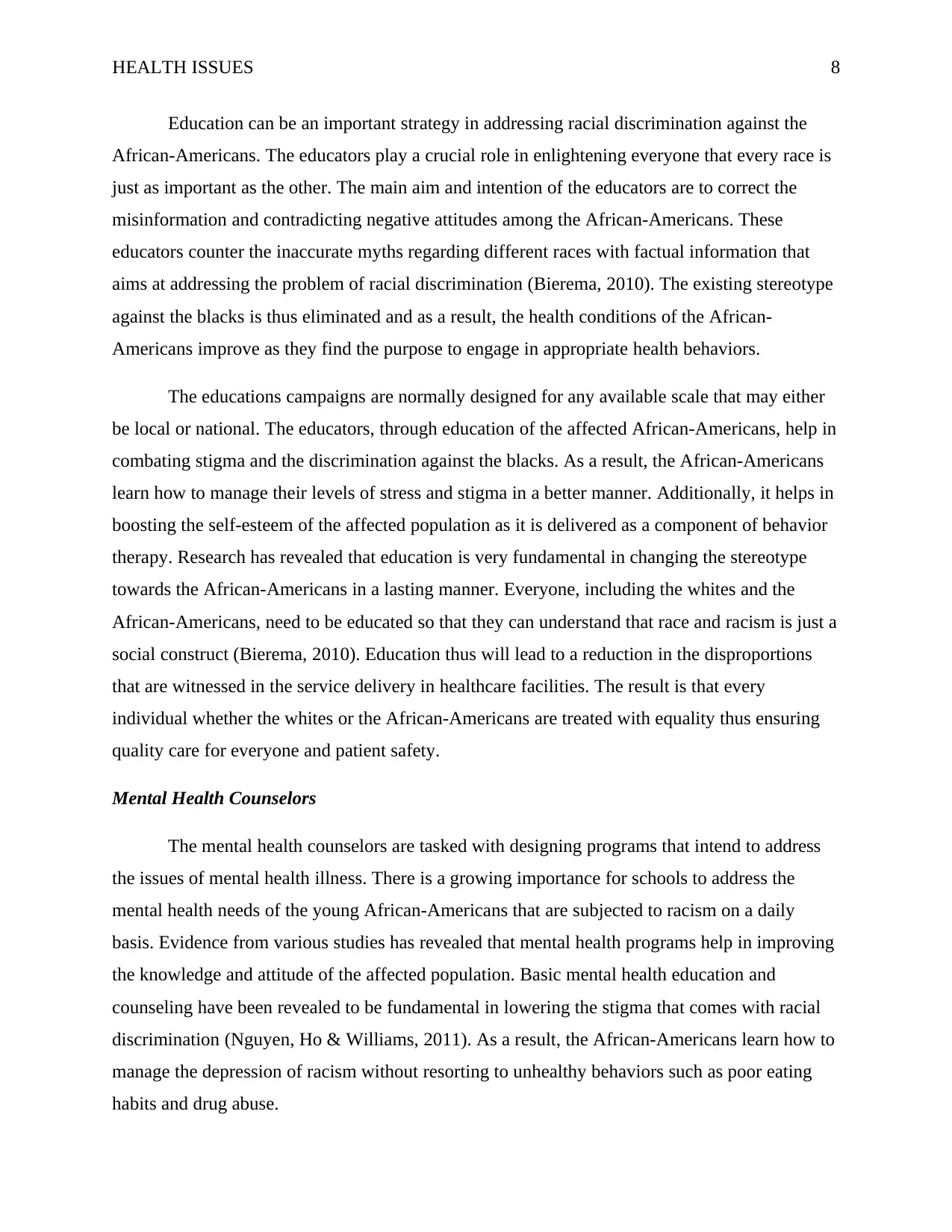
HEALTH ISSUES 8
Education can be an important strategy in addressing racial discrimination against the
African-Americans. The educators play a crucial role in enlightening everyone that every race is
just as important as the other. The main aim and intention of the educators are to correct the
misinformation and contradicting negative attitudes among the African-Americans. These
educators counter the inaccurate myths regarding different races with factual information that
aims at addressing the problem of racial discrimination (Bierema, 2010). The existing stereotype
against the blacks is thus eliminated and as a result, the health conditions of the African-
Americans improve as they find the purpose to engage in appropriate health behaviors.
The educations campaigns are normally designed for any available scale that may either
be local or national. The educators, through education of the affected African-Americans, help in
combating stigma and the discrimination against the blacks. As a result, the African-Americans
learn how to manage their levels of stress and stigma in a better manner. Additionally, it helps in
boosting the self-esteem of the affected population as it is delivered as a component of behavior
therapy. Research has revealed that education is very fundamental in changing the stereotype
towards the African-Americans in a lasting manner. Everyone, including the whites and the
African-Americans, need to be educated so that they can understand that race and racism is just a
social construct (Bierema, 2010). Education thus will lead to a reduction in the disproportions
that are witnessed in the service delivery in healthcare facilities. The result is that every
individual whether the whites or the African-Americans are treated with equality thus ensuring
quality care for everyone and patient safety.
Mental Health Counselors
The mental health counselors are tasked with designing programs that intend to address
the issues of mental health illness. There is a growing importance for schools to address the
mental health needs of the young African-Americans that are subjected to racism on a daily
basis. Evidence from various studies has revealed that mental health programs help in improving
the knowledge and attitude of the affected population. Basic mental health education and
counseling have been revealed to be fundamental in lowering the stigma that comes with racial
discrimination (Nguyen, Ho & Williams, 2011). As a result, the African-Americans learn how to
manage the depression of racism without resorting to unhealthy behaviors such as poor eating
habits and drug abuse.
Education can be an important strategy in addressing racial discrimination against the
African-Americans. The educators play a crucial role in enlightening everyone that every race is
just as important as the other. The main aim and intention of the educators are to correct the
misinformation and contradicting negative attitudes among the African-Americans. These
educators counter the inaccurate myths regarding different races with factual information that
aims at addressing the problem of racial discrimination (Bierema, 2010). The existing stereotype
against the blacks is thus eliminated and as a result, the health conditions of the African-
Americans improve as they find the purpose to engage in appropriate health behaviors.
The educations campaigns are normally designed for any available scale that may either
be local or national. The educators, through education of the affected African-Americans, help in
combating stigma and the discrimination against the blacks. As a result, the African-Americans
learn how to manage their levels of stress and stigma in a better manner. Additionally, it helps in
boosting the self-esteem of the affected population as it is delivered as a component of behavior
therapy. Research has revealed that education is very fundamental in changing the stereotype
towards the African-Americans in a lasting manner. Everyone, including the whites and the
African-Americans, need to be educated so that they can understand that race and racism is just a
social construct (Bierema, 2010). Education thus will lead to a reduction in the disproportions
that are witnessed in the service delivery in healthcare facilities. The result is that every
individual whether the whites or the African-Americans are treated with equality thus ensuring
quality care for everyone and patient safety.
Mental Health Counselors
The mental health counselors are tasked with designing programs that intend to address
the issues of mental health illness. There is a growing importance for schools to address the
mental health needs of the young African-Americans that are subjected to racism on a daily
basis. Evidence from various studies has revealed that mental health programs help in improving
the knowledge and attitude of the affected population. Basic mental health education and
counseling have been revealed to be fundamental in lowering the stigma that comes with racial
discrimination (Nguyen, Ho & Williams, 2011). As a result, the African-Americans learn how to
manage the depression of racism without resorting to unhealthy behaviors such as poor eating
habits and drug abuse.
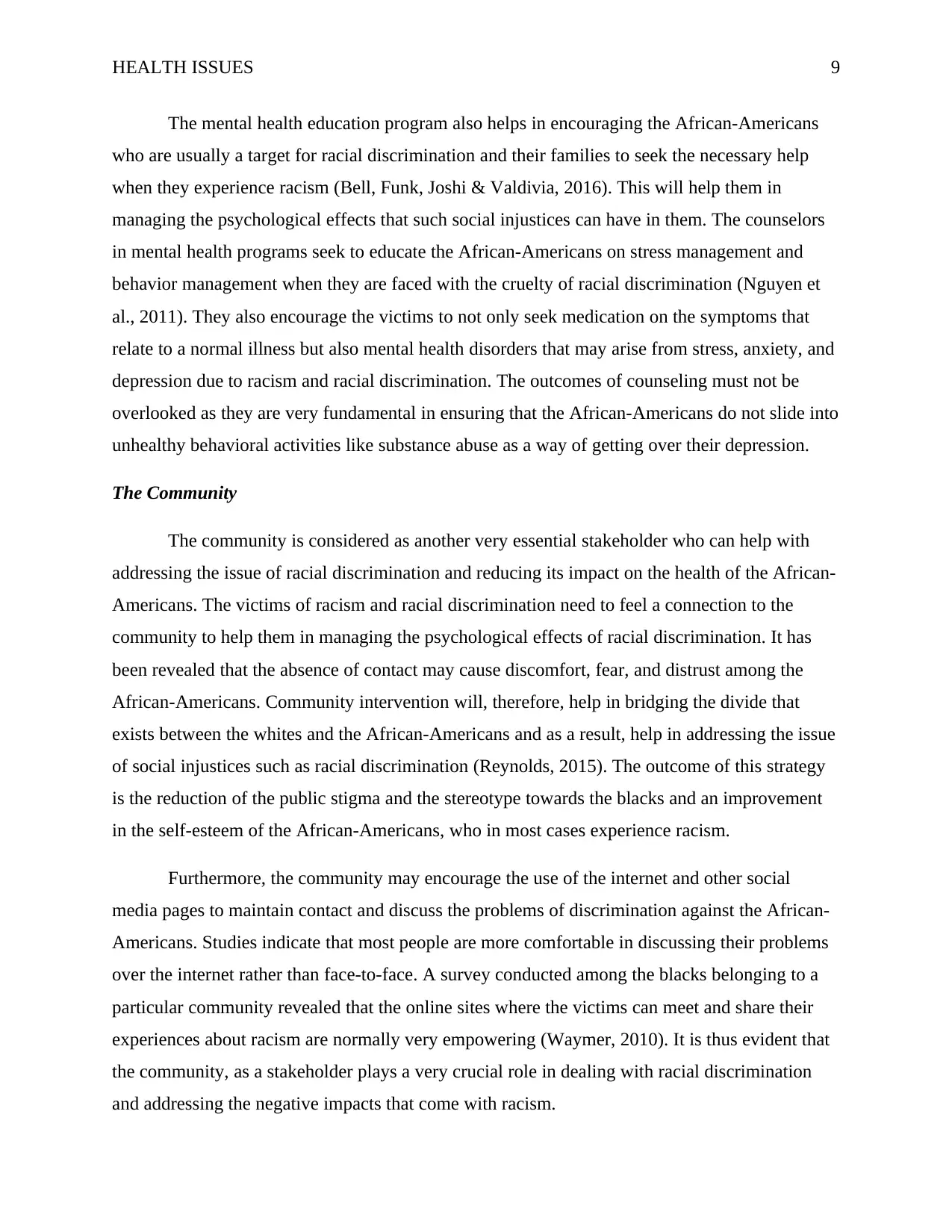
HEALTH ISSUES 9
The mental health education program also helps in encouraging the African-Americans
who are usually a target for racial discrimination and their families to seek the necessary help
when they experience racism (Bell, Funk, Joshi & Valdivia, 2016). This will help them in
managing the psychological effects that such social injustices can have in them. The counselors
in mental health programs seek to educate the African-Americans on stress management and
behavior management when they are faced with the cruelty of racial discrimination (Nguyen et
al., 2011). They also encourage the victims to not only seek medication on the symptoms that
relate to a normal illness but also mental health disorders that may arise from stress, anxiety, and
depression due to racism and racial discrimination. The outcomes of counseling must not be
overlooked as they are very fundamental in ensuring that the African-Americans do not slide into
unhealthy behavioral activities like substance abuse as a way of getting over their depression.
The Community
The community is considered as another very essential stakeholder who can help with
addressing the issue of racial discrimination and reducing its impact on the health of the African-
Americans. The victims of racism and racial discrimination need to feel a connection to the
community to help them in managing the psychological effects of racial discrimination. It has
been revealed that the absence of contact may cause discomfort, fear, and distrust among the
African-Americans. Community intervention will, therefore, help in bridging the divide that
exists between the whites and the African-Americans and as a result, help in addressing the issue
of social injustices such as racial discrimination (Reynolds, 2015). The outcome of this strategy
is the reduction of the public stigma and the stereotype towards the blacks and an improvement
in the self-esteem of the African-Americans, who in most cases experience racism.
Furthermore, the community may encourage the use of the internet and other social
media pages to maintain contact and discuss the problems of discrimination against the African-
Americans. Studies indicate that most people are more comfortable in discussing their problems
over the internet rather than face-to-face. A survey conducted among the blacks belonging to a
particular community revealed that the online sites where the victims can meet and share their
experiences about racism are normally very empowering (Waymer, 2010). It is thus evident that
the community, as a stakeholder plays a very crucial role in dealing with racial discrimination
and addressing the negative impacts that come with racism.
The mental health education program also helps in encouraging the African-Americans
who are usually a target for racial discrimination and their families to seek the necessary help
when they experience racism (Bell, Funk, Joshi & Valdivia, 2016). This will help them in
managing the psychological effects that such social injustices can have in them. The counselors
in mental health programs seek to educate the African-Americans on stress management and
behavior management when they are faced with the cruelty of racial discrimination (Nguyen et
al., 2011). They also encourage the victims to not only seek medication on the symptoms that
relate to a normal illness but also mental health disorders that may arise from stress, anxiety, and
depression due to racism and racial discrimination. The outcomes of counseling must not be
overlooked as they are very fundamental in ensuring that the African-Americans do not slide into
unhealthy behavioral activities like substance abuse as a way of getting over their depression.
The Community
The community is considered as another very essential stakeholder who can help with
addressing the issue of racial discrimination and reducing its impact on the health of the African-
Americans. The victims of racism and racial discrimination need to feel a connection to the
community to help them in managing the psychological effects of racial discrimination. It has
been revealed that the absence of contact may cause discomfort, fear, and distrust among the
African-Americans. Community intervention will, therefore, help in bridging the divide that
exists between the whites and the African-Americans and as a result, help in addressing the issue
of social injustices such as racial discrimination (Reynolds, 2015). The outcome of this strategy
is the reduction of the public stigma and the stereotype towards the blacks and an improvement
in the self-esteem of the African-Americans, who in most cases experience racism.
Furthermore, the community may encourage the use of the internet and other social
media pages to maintain contact and discuss the problems of discrimination against the African-
Americans. Studies indicate that most people are more comfortable in discussing their problems
over the internet rather than face-to-face. A survey conducted among the blacks belonging to a
particular community revealed that the online sites where the victims can meet and share their
experiences about racism are normally very empowering (Waymer, 2010). It is thus evident that
the community, as a stakeholder plays a very crucial role in dealing with racial discrimination
and addressing the negative impacts that come with racism.
⊘ This is a preview!⊘
Do you want full access?
Subscribe today to unlock all pages.

Trusted by 1+ million students worldwide
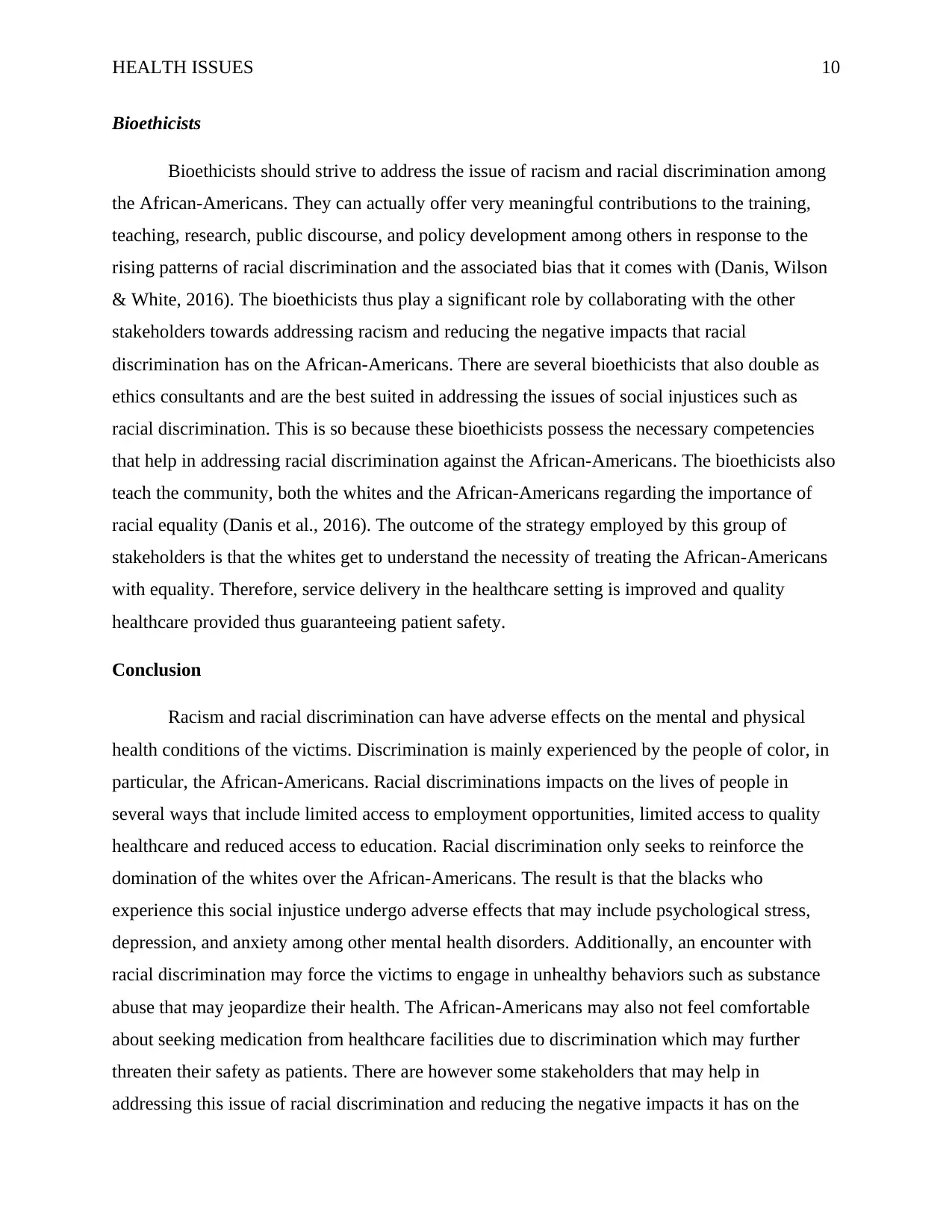
HEALTH ISSUES 10
Bioethicists
Bioethicists should strive to address the issue of racism and racial discrimination among
the African-Americans. They can actually offer very meaningful contributions to the training,
teaching, research, public discourse, and policy development among others in response to the
rising patterns of racial discrimination and the associated bias that it comes with (Danis, Wilson
& White, 2016). The bioethicists thus play a significant role by collaborating with the other
stakeholders towards addressing racism and reducing the negative impacts that racial
discrimination has on the African-Americans. There are several bioethicists that also double as
ethics consultants and are the best suited in addressing the issues of social injustices such as
racial discrimination. This is so because these bioethicists possess the necessary competencies
that help in addressing racial discrimination against the African-Americans. The bioethicists also
teach the community, both the whites and the African-Americans regarding the importance of
racial equality (Danis et al., 2016). The outcome of the strategy employed by this group of
stakeholders is that the whites get to understand the necessity of treating the African-Americans
with equality. Therefore, service delivery in the healthcare setting is improved and quality
healthcare provided thus guaranteeing patient safety.
Conclusion
Racism and racial discrimination can have adverse effects on the mental and physical
health conditions of the victims. Discrimination is mainly experienced by the people of color, in
particular, the African-Americans. Racial discriminations impacts on the lives of people in
several ways that include limited access to employment opportunities, limited access to quality
healthcare and reduced access to education. Racial discrimination only seeks to reinforce the
domination of the whites over the African-Americans. The result is that the blacks who
experience this social injustice undergo adverse effects that may include psychological stress,
depression, and anxiety among other mental health disorders. Additionally, an encounter with
racial discrimination may force the victims to engage in unhealthy behaviors such as substance
abuse that may jeopardize their health. The African-Americans may also not feel comfortable
about seeking medication from healthcare facilities due to discrimination which may further
threaten their safety as patients. There are however some stakeholders that may help in
addressing this issue of racial discrimination and reducing the negative impacts it has on the
Bioethicists
Bioethicists should strive to address the issue of racism and racial discrimination among
the African-Americans. They can actually offer very meaningful contributions to the training,
teaching, research, public discourse, and policy development among others in response to the
rising patterns of racial discrimination and the associated bias that it comes with (Danis, Wilson
& White, 2016). The bioethicists thus play a significant role by collaborating with the other
stakeholders towards addressing racism and reducing the negative impacts that racial
discrimination has on the African-Americans. There are several bioethicists that also double as
ethics consultants and are the best suited in addressing the issues of social injustices such as
racial discrimination. This is so because these bioethicists possess the necessary competencies
that help in addressing racial discrimination against the African-Americans. The bioethicists also
teach the community, both the whites and the African-Americans regarding the importance of
racial equality (Danis et al., 2016). The outcome of the strategy employed by this group of
stakeholders is that the whites get to understand the necessity of treating the African-Americans
with equality. Therefore, service delivery in the healthcare setting is improved and quality
healthcare provided thus guaranteeing patient safety.
Conclusion
Racism and racial discrimination can have adverse effects on the mental and physical
health conditions of the victims. Discrimination is mainly experienced by the people of color, in
particular, the African-Americans. Racial discriminations impacts on the lives of people in
several ways that include limited access to employment opportunities, limited access to quality
healthcare and reduced access to education. Racial discrimination only seeks to reinforce the
domination of the whites over the African-Americans. The result is that the blacks who
experience this social injustice undergo adverse effects that may include psychological stress,
depression, and anxiety among other mental health disorders. Additionally, an encounter with
racial discrimination may force the victims to engage in unhealthy behaviors such as substance
abuse that may jeopardize their health. The African-Americans may also not feel comfortable
about seeking medication from healthcare facilities due to discrimination which may further
threaten their safety as patients. There are however some stakeholders that may help in
addressing this issue of racial discrimination and reducing the negative impacts it has on the
Paraphrase This Document
Need a fresh take? Get an instant paraphrase of this document with our AI Paraphraser
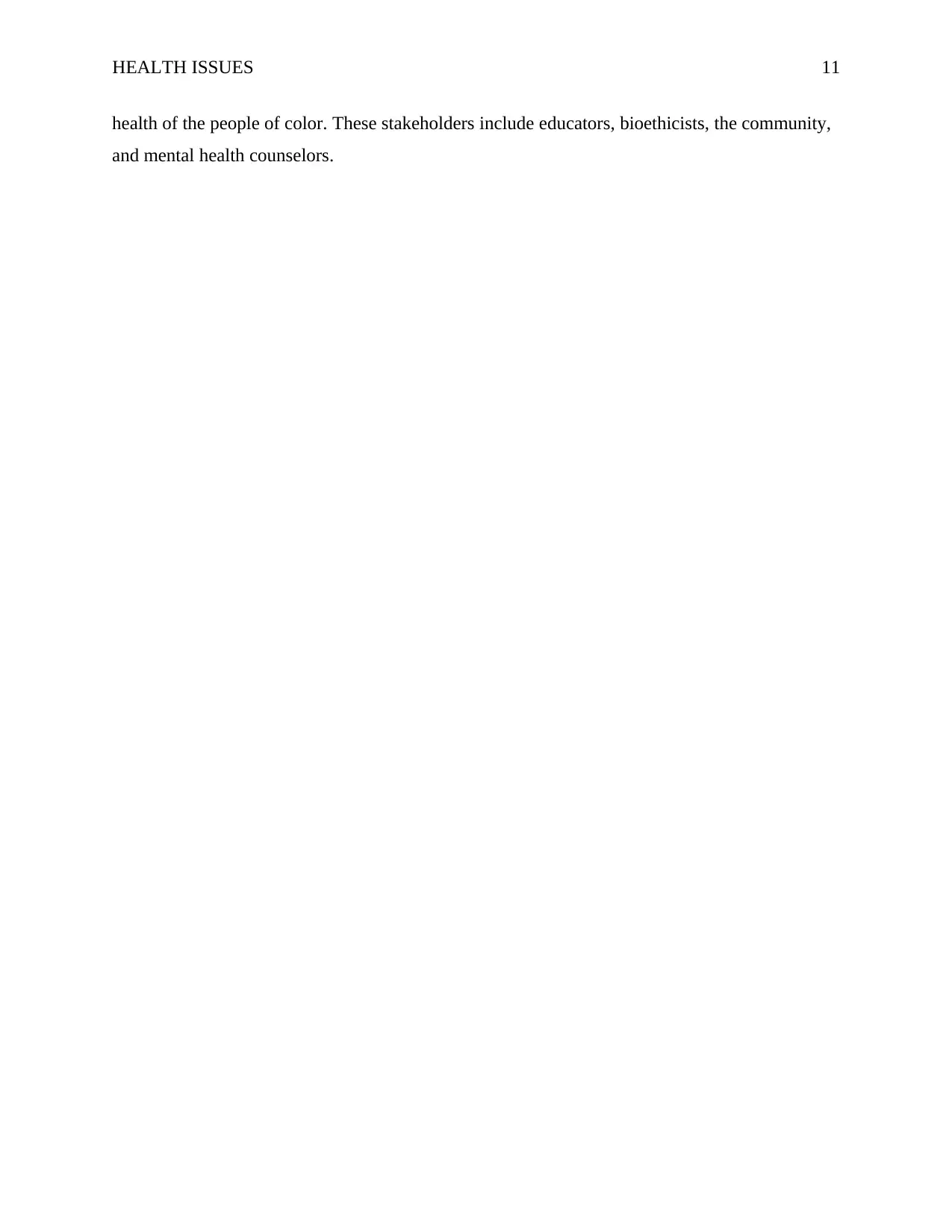
HEALTH ISSUES 11
health of the people of color. These stakeholders include educators, bioethicists, the community,
and mental health counselors.
health of the people of color. These stakeholders include educators, bioethicists, the community,
and mental health counselors.
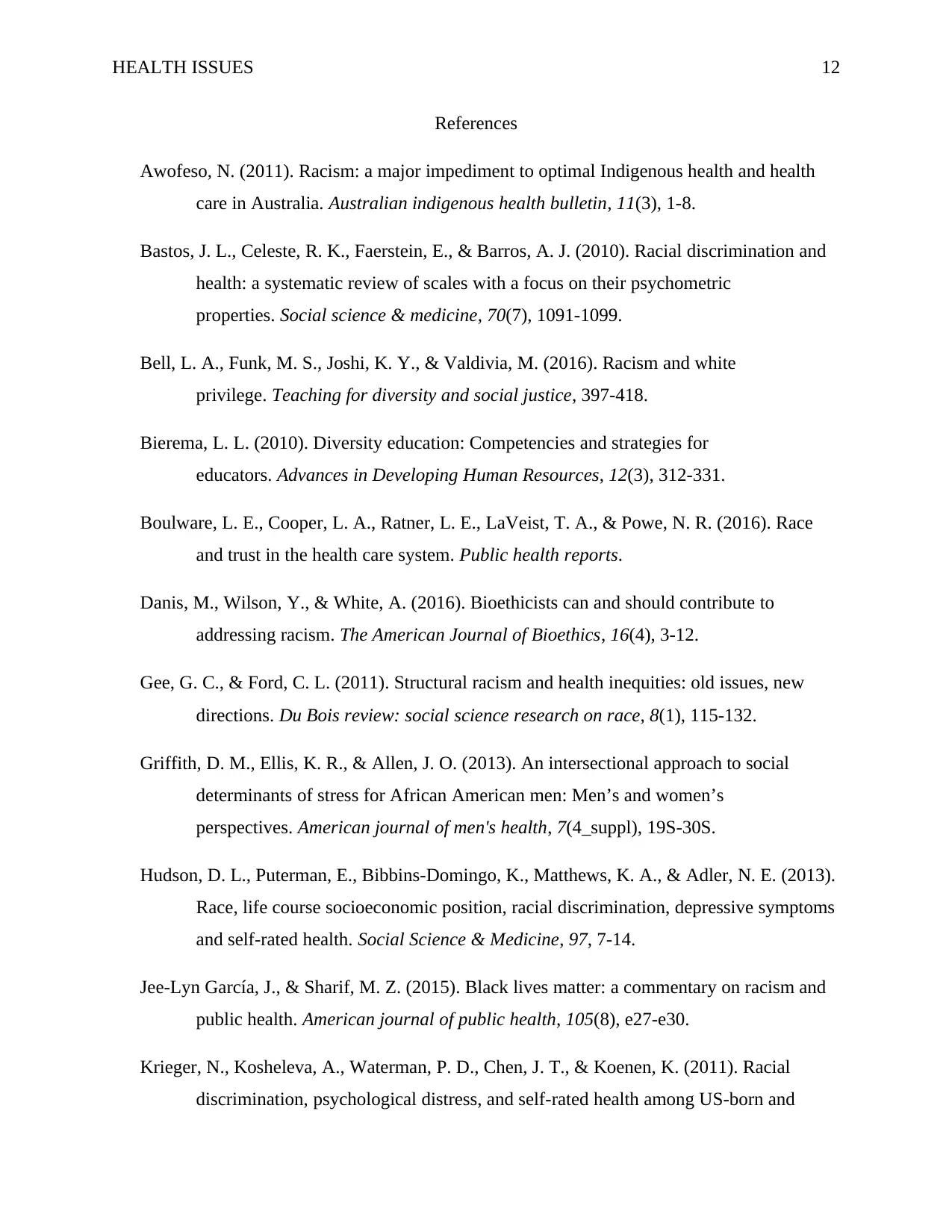
HEALTH ISSUES 12
References
Awofeso, N. (2011). Racism: a major impediment to optimal Indigenous health and health
care in Australia. Australian indigenous health bulletin, 11(3), 1-8.
Bastos, J. L., Celeste, R. K., Faerstein, E., & Barros, A. J. (2010). Racial discrimination and
health: a systematic review of scales with a focus on their psychometric
properties. Social science & medicine, 70(7), 1091-1099.
Bell, L. A., Funk, M. S., Joshi, K. Y., & Valdivia, M. (2016). Racism and white
privilege. Teaching for diversity and social justice, 397-418.
Bierema, L. L. (2010). Diversity education: Competencies and strategies for
educators. Advances in Developing Human Resources, 12(3), 312-331.
Boulware, L. E., Cooper, L. A., Ratner, L. E., LaVeist, T. A., & Powe, N. R. (2016). Race
and trust in the health care system. Public health reports.
Danis, M., Wilson, Y., & White, A. (2016). Bioethicists can and should contribute to
addressing racism. The American Journal of Bioethics, 16(4), 3-12.
Gee, G. C., & Ford, C. L. (2011). Structural racism and health inequities: old issues, new
directions. Du Bois review: social science research on race, 8(1), 115-132.
Griffith, D. M., Ellis, K. R., & Allen, J. O. (2013). An intersectional approach to social
determinants of stress for African American men: Men’s and women’s
perspectives. American journal of men's health, 7(4_suppl), 19S-30S.
Hudson, D. L., Puterman, E., Bibbins-Domingo, K., Matthews, K. A., & Adler, N. E. (2013).
Race, life course socioeconomic position, racial discrimination, depressive symptoms
and self-rated health. Social Science & Medicine, 97, 7-14.
Jee-Lyn García, J., & Sharif, M. Z. (2015). Black lives matter: a commentary on racism and
public health. American journal of public health, 105(8), e27-e30.
Krieger, N., Kosheleva, A., Waterman, P. D., Chen, J. T., & Koenen, K. (2011). Racial
discrimination, psychological distress, and self-rated health among US-born and
References
Awofeso, N. (2011). Racism: a major impediment to optimal Indigenous health and health
care in Australia. Australian indigenous health bulletin, 11(3), 1-8.
Bastos, J. L., Celeste, R. K., Faerstein, E., & Barros, A. J. (2010). Racial discrimination and
health: a systematic review of scales with a focus on their psychometric
properties. Social science & medicine, 70(7), 1091-1099.
Bell, L. A., Funk, M. S., Joshi, K. Y., & Valdivia, M. (2016). Racism and white
privilege. Teaching for diversity and social justice, 397-418.
Bierema, L. L. (2010). Diversity education: Competencies and strategies for
educators. Advances in Developing Human Resources, 12(3), 312-331.
Boulware, L. E., Cooper, L. A., Ratner, L. E., LaVeist, T. A., & Powe, N. R. (2016). Race
and trust in the health care system. Public health reports.
Danis, M., Wilson, Y., & White, A. (2016). Bioethicists can and should contribute to
addressing racism. The American Journal of Bioethics, 16(4), 3-12.
Gee, G. C., & Ford, C. L. (2011). Structural racism and health inequities: old issues, new
directions. Du Bois review: social science research on race, 8(1), 115-132.
Griffith, D. M., Ellis, K. R., & Allen, J. O. (2013). An intersectional approach to social
determinants of stress for African American men: Men’s and women’s
perspectives. American journal of men's health, 7(4_suppl), 19S-30S.
Hudson, D. L., Puterman, E., Bibbins-Domingo, K., Matthews, K. A., & Adler, N. E. (2013).
Race, life course socioeconomic position, racial discrimination, depressive symptoms
and self-rated health. Social Science & Medicine, 97, 7-14.
Jee-Lyn García, J., & Sharif, M. Z. (2015). Black lives matter: a commentary on racism and
public health. American journal of public health, 105(8), e27-e30.
Krieger, N., Kosheleva, A., Waterman, P. D., Chen, J. T., & Koenen, K. (2011). Racial
discrimination, psychological distress, and self-rated health among US-born and
⊘ This is a preview!⊘
Do you want full access?
Subscribe today to unlock all pages.

Trusted by 1+ million students worldwide
1 out of 14
Related Documents
Your All-in-One AI-Powered Toolkit for Academic Success.
+13062052269
info@desklib.com
Available 24*7 on WhatsApp / Email
![[object Object]](/_next/static/media/star-bottom.7253800d.svg)
Unlock your academic potential
Copyright © 2020–2026 A2Z Services. All Rights Reserved. Developed and managed by ZUCOL.





